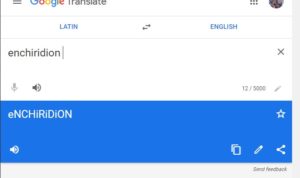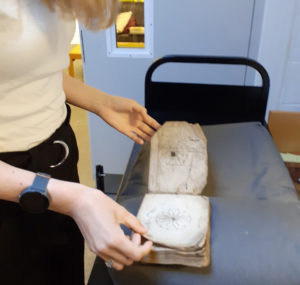The Very Rev John Lee (1779-1859)
In this blog post, Megan Briers, Mathematics and Computer Science student, shares her experience as a summer intern with the Special Collections team.
The Very Reverend Professor John Lee (1779-1859) was appointed principal of the United College, St Andrews, in 1837.
Lee was a polymath, meaning he was a master of many disciplines. He was a Church of Scotland minister, served time as a surgeon, studied law and was professor of both ecclesiastical history in St Mary’s College from 1812 and moral philosophy at King’s College, Aberdeen. He resigned both chairs in 1823 to become Minister of Canongate Church and held other prestigious charges including St Giles, Edinburgh. He was appointed Principal Clerk of the General Assembly of the Church of Scotland in 1827. He held office as Principal of the United College for only a short time before returning to Edinburgh to become Principal and eventually also professor of divinity at the University of Edinburgh. More relevant for this blog post though, is the fact that he was an avid reader and bibliophile (person who collects books).
His book collecting habits were described in Hill Burton’s The Book Collector, where he is characterised as Archdeacon Meadow. The whole characterisation is available online, but here is a highlight of a particularly funny description of Lee :
‘Then, again, can one forget that occasion of his going to London to be examined by a committee of the House of Commons, when he suddenly disappeared with all his money in his pocket, and returned penniless, followed by a waggon containing 372 copies of rare editions of the Bible? All were fish that came to his net. At one time you might find him securing a minnow for sixpence at a stall—and presently afterwards he outbids some princely collector, and secures with frantic impetuosity, “at any price,” a great fish he has been patiently watching year after year. His hunting-grounds were wide and distant, and there were mysterious rumours about the numbers of copies, all identically the same in edition and minor individualities, which he possessed of certain books. I have known him, indeed, when beaten at an auction, turn round resignedly and say, “Well, so be it—but I daresay I have ten or twelve copies at home, if I could lay hands on them.”‘
Unfortunately for the university, during his time in St Andrews, Lee seemed to have misunderstood the concept of a library. Instead of returning the books he had taken out, he just left with them. To really top it off, after his death, some of the items he had “borrowed” were then sold back to the university!
After he died in 1859, there were several sales in order to work through his extensive collection of items. To most people, anything over 100 books could be classed as an extensive collection, but Lee took this to a whole other level. It was said that he had a library of twenty thousand volumes!! There were still sales happening 4 years after his death, and in the most recent catalogue I have been looking at, the 1860 Rare Books sale, there were 3030 items available for purchase!
For the past four weeks I have been interning with Special Collections in the Library. My job was to go through some of the sales catalogue (a select few – there was no way I could tackle the entire lot in a month) and try to see if we had any potentially matching items in the archives or the catalogues of items present in the library. There were already notes on some of the items in the archive indicating that they had come from specific Lee sales, but Special Collections wanted to see if we could match up a few more.

Starting with the 1861 manuscript sale, I worked my way through the (comparatively small number of) 583 items. There were occasional markings in the margins, such as check marks and crosses. These unfortunately followed a seemingly very random pattern. You would like to think that the ticks and checks would indicate that an item had been purchased, which occasionally did align, but there were multiple times where I found items with no indication that the bidder was interested in the item at all, and multiple times where items with marking just weren’t present in the digital catalogue of the archives. There is a chance that these items are within the university’s collections but they haven’t yet been catalogued.
As expected with such a large collection, there were some interesting finds. A typical book in his collection is a group of sermons, lecture notes or minutes from various church meetings, but there are also some gems buried. The following titles are some of my favourite most obscure items:






Due to the conventions of the 19th century, there was quite a lot of Latin I had to work through. I have a little Latin experience which definitely helped, and I found my ability to read and match the titles improved over the four weeks, but there were still some tricky parts. Luckily, we have an incredible tool, Google translate, right? Or not so helpful as I found out….

The four weeks I spent working through the material absolutely flew by and I am happy that I managed to cover all the manuscript items from the 1860 sale and get a good start on some of the rare book items. I have learnt how to search effectively for the items on sale and became familiar with the kind of items Lee was holding that the university was interested in buying back. I also learned just how extensive the university’s archive collection is. Although it may have seemed like repetitive work for a lot of people, getting to explore everyday the lists of books and items Lee had on his shelves was an incredibly exciting task and I have really enjoyed my time working with Special Collections!
Thank you to Briony, Beth and Maia for being so helpful and friendly over the weeks, and I guess I also owe a thank you to John Lee himself, for taking all these items away, so I could spend part of my summer doing some detective style work trying to trace them back!

Megan Briers
Summer Intern, Special Collections
Enchiridion sounds more Greek than Latin